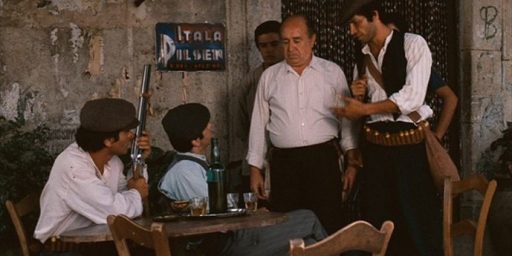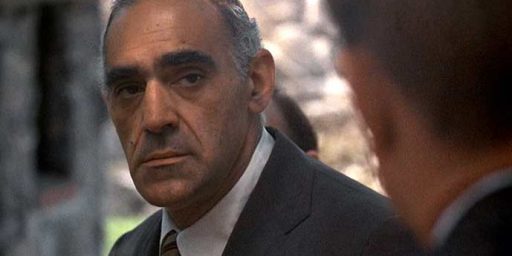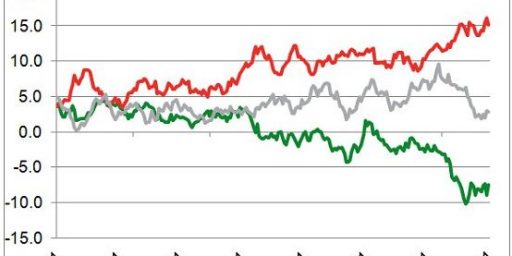Towards a Pax Corleone
Via Andrew Sullivan, I discovered this article, in which John C. Hulsman compares different approaches to foreign policy using The Godfather as a metaphor.
THE STRATEGY that ultimately saves the Corleone family from the Sollozzo threat and equips it for coping with multipolarity comes from Michael, the youngest and least experienced of the don’s sons. Unlike Tom, whose labors as family lawyer have produced an exaggerated devotion to negotiation, and Sonny, whose position as untested heir apparent has produced a zeal for utilizing the family arsenal, Michael has no formulaic fixation on a particular policy instrument. Instead, his overriding goal is to protect the family’s interests and save it from impending ruin by any and all means necessary. In today’s foreign-policy terminology, Michael is a realist.
Hulsman argues that it’s Michael’s “realism” in dealing with the Corleone’s enemies that America should emulate, as opposed to the “liberal internationalism” of Tom Hagen or the “neoconservativsm” of Sonny.
It’s a fun article, but I think the points that Hulsman wants to make are too constrained by the metaphor. I love The Godfather as much as anybody, but let’s not forget how Michael ends up–alone and friendless, with no more power in the world, an ocean of blood on his hands, and only a little dog who cares that he’s gone.
Maybe we should consider better role models for our actions.






Yeah, I read the article last week. I hate gangster pictures, at least partially because people are too inclined to draw lessons like the ones in this article from them.
Two things that bear mentioning. First, foreign policy realism demonstrably is one of the factors that put us in the fix in which we found ourselves in September 2001. If you look at practically everything that people in the Middle East complain about in American foreign policy, they’re the results of foreign policy realism. I don’t mean that I think that IR realism is bad; I just don’t think it’s enough.
Second, the article doesn’t mention the third, brother, Angelo, who went to live in a small town in rural Iowa and, contrary to the ways things would work in a Hollywood movie, he lived there happily and peacefully to the end of his days.
That’s the strain of American foreign policy thought that’s missing from Hulsman’s article, isolationism, and I think it’s rather more likely that we’ll move towards isolationism than it is that we’ll move back towards realism which, unfortunately, wasn’t nearly realistic enough.
Dave, I’m with you on the gangster picture front. Partially for the reason you state, but mostly because of a serious lack of character likability. The Godfather is, I think, the only gangster movie I like, other than perhaps Donnie Brasco, precisely because of Michael and of Vito’s relationship with Michael. I like The Godfather Part II much less as Michael becomes less likable and his motivations grow farther and farther away from my own experience.